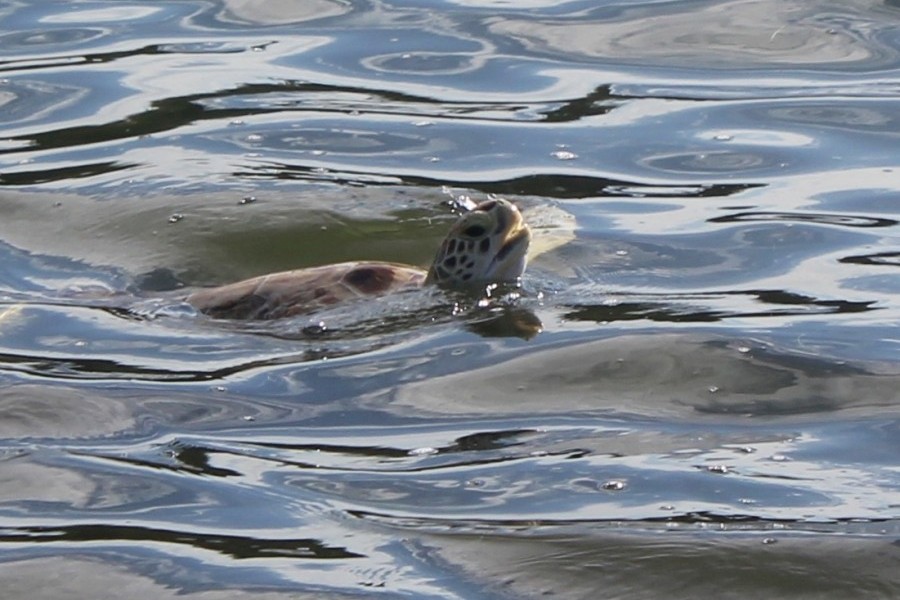Be vigilant for marine life this summer boating season
As you enjoy Southwest Florida's coastal waters this summer, Mote recommends that boaters follow Coast Guard-approved safe boating guidelines and use vigilance to avoid striking sea turtles, manatees and dolphins.
Mote scientists are also asking boaters to keep an eye out for whale sharks moving through our region (details below). Florida’s Gulf Coast waters aren’t just beautiful for boating — they also provide important habitat for many protected species.
Sea turtles are swimming just offshore to mate before the females come ashore to nest, juvenile turtles are feeding along the Gulf Coast, and by early summer the first hatchlings will venture into Gulf waters. Turtles are also nesting on local beaches, so watching out for them is especially important. So far this year, Mote's animal rescuers have responded to or received nearly 50 distressed or deceased sea turtles, including several affected by human activity.
To help address the threats faced by turtles, including sea turtles, the nationally-recognized World Turtle Day, on Saturday, May 23, raises awareness and respect for these reptiles.
Dolphins are giving birth during late spring and summer, and they frequently use shallow waters where they can not dive below an approaching boat. So far in 2015, Mote has responded to reports of four stranded bottlenose dolphins (two resident Sarasota Bay dolphins) and Mote worked with the Florida Fish and Wildlife Conservation Commission and law enforcement officers to respond to nine pygmy killer whales that came too close to shore. The team guided the whales into deeper waters they normally inhabit.
Manatees are also on the move, returning to our bay waters for foraging and mating.
Here are specific ways to help keep our waters safe for marine life:
- Within Sarasota or Manatee county waters, if you see an entangled, stranded or dead dolphin, whale or sea turtle, please call Mote's Stranding Investigations Program, a 24-hour response service, at 888-345-2335. If you see an entangled, stranded or dead manatee anywhere in state waters or an entangled, stranded or dead dolphin, whale or sea turtle outside of Sarasota or Manatee counties please call the FWC Wildlife Alert hotline at 888-404-FWCC (3922), #FWC, *FWC on your cellular phone or use VHF Channel 16 on your marine radio.
- Boaters should follow 10 dolphin-friendly viewing tips. Click here for a PDF. These tips were made with dolphins in mind, but they're also great guidelines for the best ways to view all large marine animals.
- Wearing polarized sunglasses can help boaters see marine life in their path.
- Boaters and beachgoers should never feed marine wildlife. Click here to watch a PSA about why it’s harmful and illegal to feed wild dolphins: www.dontfeedwilddolphins.com.
- Beachgoers should stay away from sea turtle nests marked with yellow stakes and tape, and seabird nesting zones that are bounded by ropes. Dogs are not allowed on Sarasota County beaches other than Brohard Paw Park in Venice, where they must be leashed or under voice control, according to county ordinances.
- For numbers of sea turtle nests documented by Mote each week, along with more tips on how to protect sea turtles, visit www.mote.org/2015nesting
- Be sure to stow trash and line when under way. Marine debris that accidentally blows overboard or out of a truck can become ingested by or entangled around marine life.
- If you observe a manatee mating herd - several manatees gathered as males vie to mate with a female - watch the manatees from at least 100 feet away. Coming any closer might disrupt the animals' natural mating behavior or put people into harm's way. Adult manatees typically weigh upwards of 1,000 pounds and people could be seriously injured.
Special note about whale sharks: Mote scientists are asking members of the public to immediately report any new sightings of whale sharks along Florida’s Gulf coast. These gentle filter-feeding fish are seen in various places in the Gulf of Mexico and sporadically visit Southwest Florida’s coastal waters, most likely to feed on localized blooms of plankton or on fish eggs. Mote scientists are collecting reports of whale shark sightings to look for possible patterns to their movements in our waters.
- Please report new whale shark sightings immediately by calling Mote’s Center for Shark Research at 941-388-1827. Please note the number of whale sharks you saw along with the time, date and location (GPS coordinates if possible). Please provide your phone number and/or e-mail and note whether you can provide photos. (Please do not report sightings prior to May 2015 unless you precisely documented the sighting, including date, specific location and number of whale sharks.)
